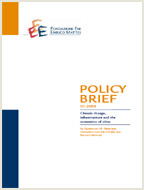Climate Change, Infrastructure and the Economics of Cities
Cities promote economic development as they allow agglomeration economies to materialize. These benefits can be seized provided that effective urban infrastructure fosters knowledge spillovers, labour market pooling, input sharing as well as demand and cost linkages. Currently climate change is increasing the costs associated with the geographical concentration of economic activities in cities while urban sprawl is weakening the social and economic interactions through which agglomeration economies work. Urban sprawl is also weakening the economic and social viability of large infrastructural investments that are needed to tackle the twin challenges of climate change and urbanization. In this respect, a crucial prerequisite for climate-proof urban infrastructure is the implementation of integrated land use and transport policies allowing for compact cities to develop.

